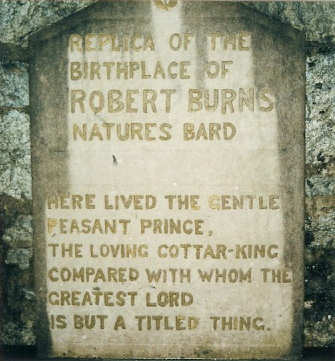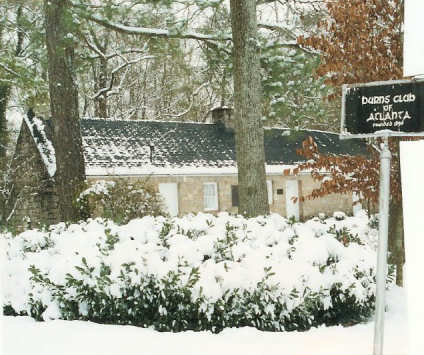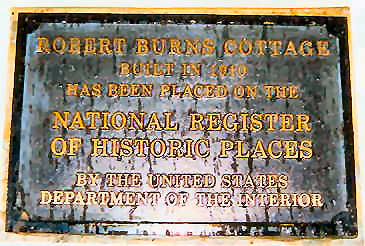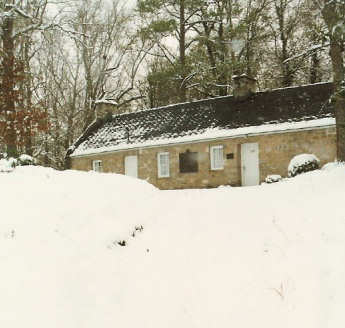|
Since its inception in 1896, the Burns Club of Atlanta
has met the first Wednesday of each month. For 111 years there has been a
monthly speaker who has reflected the club’s charter that it is a literary
club. While the cottage bears the imprint of the home where Robert Burns was
born and the name of the club bears his name, these speeches may also be
about other literary giants, not just Burns.
We gathered this year for our July meeting on
Independence Day 2007 to hear a talk by member David Grant who serves as the
club’s historian. Yes, the club meets the first Wednesday no matter the date
of the month. We were treated by David with a talk on the “Founding
Fathers…of the Burns Club”. It was mentioned in the monthly newsletter that
it would be “…interesting to look back at some of the founders of the Burns
Club, those men whose images and names grace the walls of the cottage”.
In following the custom of a response by another member
following the discourse, I was asked to give that response, and since
edited, it follows below.

A Place To Come To

Ralph Waldo Emerson once wrote that “the people who care
nothing for literature and poetry care for Burns.” On the other hand, this
club was founded by men who care for literature, poetry, and Burns.
What a vision these early Atlanta Burns Club members had
- to build a cottage in 1910 to the exact specifications as the “auld clay
biggin” in Alloway where Burns was born in 1759! No more hotels for them. No
more meetings in the homes of members for them. They wanted a permanent
place that would reflect their love for Burns and other men of literature.
What better place than a cottage like the one where Burns was born? Or, as
William Penn Warren simply wrote in his last novel, A Place To Come To.
This cottage became a place to come to on a regular basis
– a home that offered members an opportunity to meet together to discuss
literature, poetry, Robert Burns, and swap personal incidents that had
happened since the last meeting. Each month a poem, song or letter by Burns
is read. Members share a meal, a glass of wine, a “wee dram” or two, and now
as then, they express their goodwill toward each other.
The Burns Cottage became a place of good times, good
memories, good food, good friends, and from time to time, like tonight, good
speeches. It became a place of acceptance where smiles along with handshakes
and hugs abound and warmth flourishes. Its membership consists of town and
gown, construction workers and professional people, the self-employed,
businessmen, well-dressed lawyers and judges. It is a place of equality.

The cottage means a great deal to some of us, but the
cottage means a lot to all of us! This is a cottage of history as attested
by members from the beginning to now. That fact is evident since visitors to
the Atlanta area from all over the world insist on seeing and touring the
cottage. Postcards of the cottage are constantly found on eBay and, if you
are lucky enough, you may win one.
Yes, the cottage is a memorial to Robert Burns and all
men and women of literature. It is testimony to the thesis that men who love
books can meet and discuss them and their authors. I’ve seen the wonderful
ways other communities have chosen to commemorate and remember Burns. I’ve
visited statues and memorials of Burns in San Francisco, Denver,
Jacksonville, New York City, Boston, Halifax, Leith, Edinburgh, Glasgow, Ayr,
Stirling, and London on the Thames. These remembrances of Burns are
wonderful and quite beautiful. Those who built them have reason to be proud
of them. The man they honor, Robert Burns, would be pleased.

Yet none of them, in my opinion, compares to the Burns
Cottage in Atlanta - a simple Scottish cottage a few miles from downtown.
Our Burns Cottage is different since you can come in out of the cold to be
met by a log fire in the winter and a wee bit of air conditioning in the
summer. The spirit that permeates this room, month after month, would, I
believe, make Robert Burns feel at home. Some of you have been members for
30 plus years and others, like me, just a few years. But look around you at
the friends you have made since joining this club. The love of literature,
poetry, and Robert Burns has made these friendships possible. The cottage
gives each of us a sense of community and a sense of family because it gives
each of us a sense of belonging.
Thank you, David, for reminding us how we started as a
club in 1896 and for the warm memories of this place where over the years we
salute love of literature, poetry, Robert Burns and, might I add, each
other! Suffice it to say, the Atlanta Burns Cottage is our place to come to!
(FRS: 12-4-07) |

